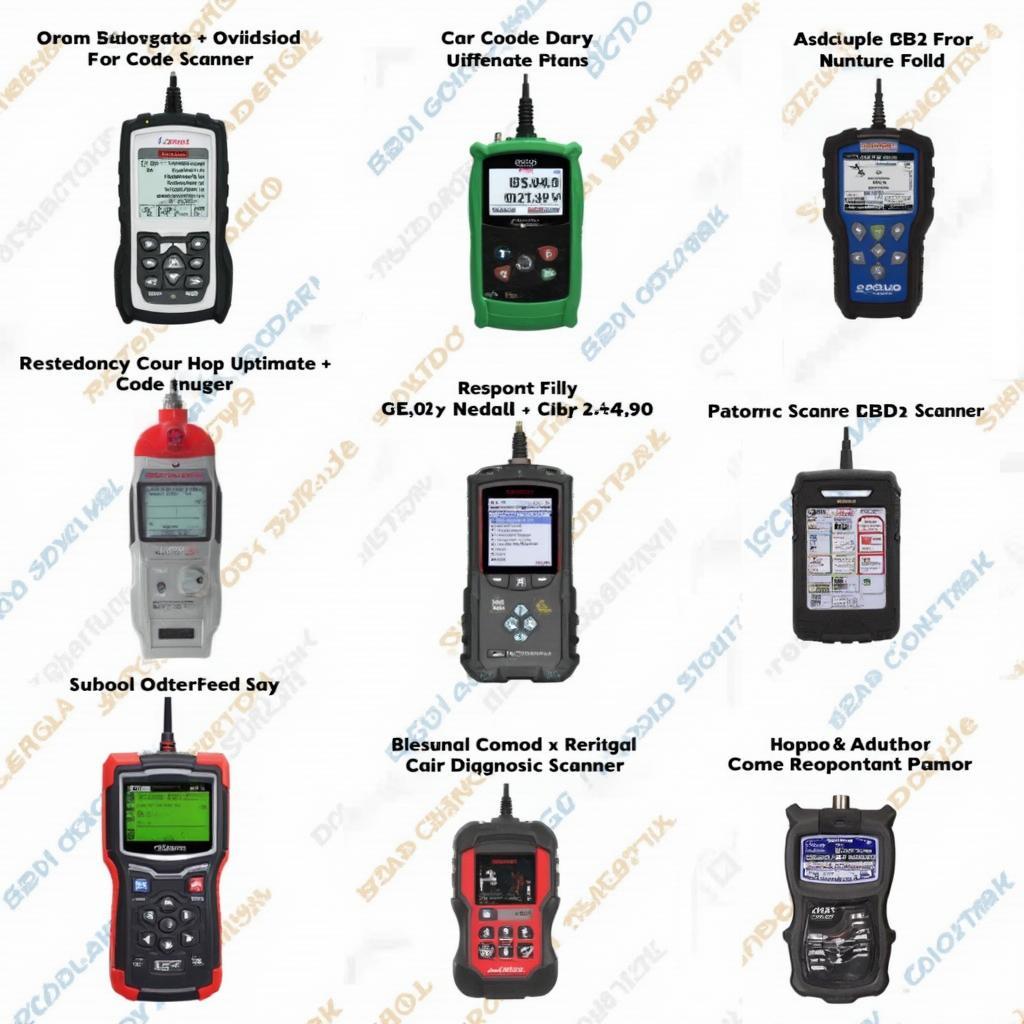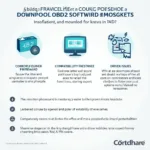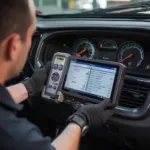An OBD2 scanner and an ABS scanner are essential tools for diagnosing car troubles. Whether you’re a professional mechanic or a DIY enthusiast, understanding the capabilities of these diagnostic devices is crucial for maintaining and repairing your vehicle. This guide explores the functionalities of OBD2 scanners and ABS scanners, their differences, and how they can help you keep your car in top condition.
Understanding the OBD2 Scanner
The OBD2 scanner, also known as an On-Board Diagnostics II scanner, is a device that connects to your car’s OBD2 port, typically located under the dashboard on the driver’s side. This port allows access to the vehicle’s computer system, which stores diagnostic trouble codes (DTCs) related to various systems, including the engine, transmission, and emissions. An OBD2 scanner reads these codes and displays them, providing valuable insights into potential problems. Basic OBD2 scanners can retrieve and clear codes, while more advanced models offer live data streaming, allowing you to monitor sensor readings in real-time. Many DIYers find these scanners invaluable for troubleshooting and resolving common car issues. Want to know more about compatible scanners? Check out the best obd2 scanner with abs and srs.
After this first introductory section, it’s important to delve deeper into the specifics of ABS scanners. Let’s explore this in more detail.
Delving into the ABS Scanner
An ABS scanner, or Anti-lock Braking System scanner, specializes in diagnosing issues within the ABS. The ABS is a safety system that prevents wheel lockup during braking, enhancing vehicle control and stability. An ABS scanner can identify specific problems within this complex system, such as faulty wheel speed sensors, malfunctioning ABS modules, or issues with the hydraulic control unit. Unlike basic OBD2 scanners, ABS scanners often provide access to manufacturer-specific codes, offering a more in-depth analysis of ABS-related issues. For a broader overview of OBD2 scanners capable of ABS and SRS diagnostics, see the obd2 scanner pc abs srs guide.
OBD2 Scanner vs. ABS Scanner: Key Differences
While some advanced OBD2 scanners can read ABS codes, not all can. The capabilities of an OBD2 scanner in relation to ABS diagnostics depend on the make, model, and year of the vehicle, as well as the specific scanner being used. Dedicated ABS scanners, on the other hand, are specifically designed to diagnose ABS problems, often offering more comprehensive coverage and deeper insights. You can learn more about the capabilities of different scanners by exploring articles such as can an obd2 scanner scan for abs codes. Choosing the right tool depends on your specific diagnostic needs.
Many people wonder if an OBD2 scanner can read ABS codes. Let’s clarify this point.
Can an OBD2 Scanner Read ABS Codes?
As mentioned earlier, some high-end OBD2 scanners can indeed read ABS codes. However, many basic models only access generic powertrain codes. It’s crucial to research the compatibility of your OBD2 scanner with your vehicle’s ABS system. This information is often available in the scanner’s documentation or on the manufacturer’s website. For a comprehensive look at scanners with advanced capabilities, consider the innova 6100p srs abs engine obd2 scanner.
Choosing the Right Scanner for Your Needs
Selecting the appropriate diagnostic tool depends on your specific requirements and the vehicles you work with. If you primarily focus on engine and transmission diagnostics, a standard OBD2 scanner might suffice. However, for comprehensive brake system diagnostics, a dedicated ABS scanner or an advanced OBD2 scanner with ABS capabilities is essential. Learn about scanners with expanded functionalities like transmission, DPF, and CAN diagnostics at obd2 scanner abs srs transmission dpf can.
“Investing in a quality diagnostic tool is essential for efficient and accurate vehicle repairs,” says John Miller, a seasoned automotive technician with over 20 years of experience. “It saves you time and money in the long run.”
What are the Benefits of Using an OBD2 Scanner ABS Scanner?
Using these scanners allows for quicker and more precise identification of vehicle problems, saving you valuable time and money. They empower you to address issues proactively, potentially preventing costly repairs down the line. “Early diagnosis is key to preventing major car problems,” adds Sarah Johnson, a leading automotive engineer specializing in vehicle diagnostics.
 Various OBD2 Scanners Available in the Market
Various OBD2 Scanners Available in the Market
Conclusion
OBD2 scanners and ABS scanners are indispensable tools for anyone involved in car maintenance and repair. Understanding their functionalities and limitations allows you to choose the right tool for your needs, enabling efficient and accurate vehicle diagnostics. Whether you’re a professional mechanic or a DIY enthusiast, investing in a quality obd2 scanner abs scanner can save you time, money, and headaches in the long run.
FAQs
-
What is an OBD2 scanner?
An OBD2 scanner is a device used to read diagnostic trouble codes from a vehicle’s computer. -
What is an ABS scanner?
An ABS scanner is a tool specifically designed to diagnose problems within a vehicle’s Anti-lock Braking System. -
Can an OBD2 scanner read ABS codes?
Some advanced OBD2 scanners can read ABS codes, while basic models may not. -
Why do I need an ABS scanner?
An ABS scanner provides detailed diagnostics of the ABS, allowing for precise identification of issues within the braking system. -
How do I choose the right scanner?
Consider your specific diagnostic needs and the types of vehicles you work with. -
Where can I find more information about OBD2 scanners?
You can find more information on our website about different OBD2 scanners, such as the best obd2 scanner with abs and srs. -
Are there scanners that handle other systems besides ABS and engine codes?
Yes, you can find scanners like the obd2 scanner abs srs transmission dpf can, which handles a wider range of car systems.
Need help? Contact us via WhatsApp: +1(641)206-8880 or Email: [email protected]. Our customer support team is available 24/7.

